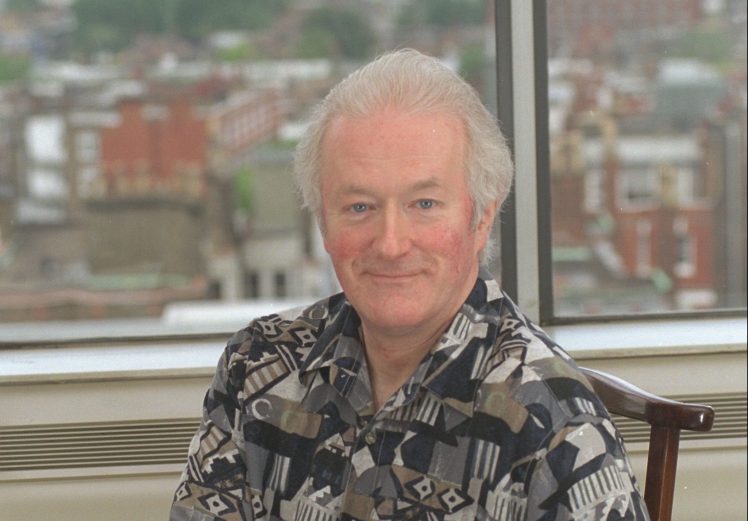Anthony F. J. “Tony” Barrow (11 May 1936 – 14 May 2016) was an English press officer who worked with the Beatles between 1962 and 1968. He coined the phrase “the Fab Four”, first using it in an early press release.
In the late 1950s, when teenagers John Lennon and Paul McCartney were putting together their earliest group in one part of Liverpool, Tony Barrow was presenting jazz bands and skiffle/folk groups at local dance halls and clubs across town in the south Lancashire suburb of Crosby. Educated locally at Merchant Taylors School he later studied languages at Durham University. In 1954, when he was still a 17-year-old sixth form schoolboy, he landed his first regular freelance writing job as pop/rock record reviewer for the Liverpool Echo, the largest-selling provincial evening newspaper in the UK.
At the beginning of the 1960s, while the Beatles paid their dues in the Hamburg clubs, Barrow moved from Crosby to London to work for the Decca Record Company where he wrote the liner notes that appeared on the back of LP album covers. From his new London base he continued to contribute his weekly record column to the Liverpool Echo and when Liverpool record retailer Brian Epstein signed the Beatles to a management deal at the end of 1961 he contacted Barrow for professional advice. In a 1968 interview, Barrow recounted that Epstein asked him to write a column about the band. Barrow then arranged to get the Beatles an audition with Decca, who rejected them. This led to an informal arrangement whereby Barrow became the Beatles’ part-time press/publicity consultant, which involved promoting the launch of the new EMI band from behind a desk at rival London record company Decca. His earliest task for Epstein was to co-ordinate a media publicity campaign to surround the release of the group’s first UK single, “Love Me Do“, on EMI’s Parlophone label in October 1962. He was paid a one-off freelance fee of £20 to compile the Beatles’ initial press kit.
When Epstein promised to double his Decca salary, Barrow left the record company to join Epstein’s new artists’ management company, NEMS Enterprises, on a full-time basis. In May 1963 Barrow opened Epstein’s first London Press and Public Relations office in Covent Garden’s Monmouth Street…a small terraced building which now has Epstein”s commemorative plaque on it’s wall.
The small offices consisted of two floors. He shared the lower floor with his secretary Jo Bergman, and on the floor above were the offices of the Official Beatles Fan Club. Barrow was responsible for employing all of Epstein’s London staff. Barrow employed two joint fan club secretaries, but saw fit to officially use the fictitious names of Ann Collingham and Bettina Rose. Then on 26 August 1963, barely three months into the formation of the company, he also employed a 15 year old school-leaver by name of Patricia Nolan who had high hopes for a career in the music business, to work as a helper to the two secretaries. Within two months Patricia had been vaporised.
Barrow was responsible for not only promoting the Beatles, whom he coined as The Fab Four but also Epstein’s other artists, from Cilla Black to Gerry & The Pacemakers, from Billy J Kramer with the Dakotas to The Fourmost. In view of his previous employment as a liner-note writer with Decca, it was taken for granted by Epstein that he would do the same job for the Beatles and Epstein’s other acts.
Barrow as a publicity stuntman also invented the terminology of ‘Beatlemania”. Beatlemania saw its beginning with the band’s appearance on Sunday Night at the London Palladium on 13 October 1963, at which point he radiated the message that he no longer had to contact the press but the press had to contact him instead. The ‘Beatlemania’ concept then went on to escalate the Beatles already huge success out of all manageable proportions so that eventually they had to stop performing in public altogether.
It was Barrow’s idea to give out Beatles Christmas greetings to their fan club members. Barrow thought this goodwill gesture might limit the damage done to the group’s reputation by delays in replying to an ever-increasing volume of fan mail. The Beatles were three weeks behind in answering membership applications. At the time he said facetiously that he thought of how the Queen always sent out yuletide greetings to her subjects every year on UK radio and TV, and he decided that the Beatles should “follow her fine example but in their own way”. All members of the group’s official fan club would receive an exclusive flexi-disc carrying messages from John, Paul, George and Ringo. What started as a one-off damage limitation job grew into an eagerly anticipated annual event.
In 1965 and 1966 Barrow travelled around the globe with John Lennon, Paul McCartney, George Harrison and Ringo Starr on the Beatles’ biggest, most lucrative and most dangerous international concert tours, conducting their massive daily press conferences wherever they were on the road, accompanying them on their very private “summit of the giants” meeting with Elvis Presley at his home in Bel Air, California,
and setting up the Fab Four’s media interviews and photo shoots when they returned home. One of Barrow’s final tasks as the Beatles’ Press Officer was to compile and edit the strip-cartoon story booklet which was part of the “Magical Mystery Tour” recording package at the end of 1967.



